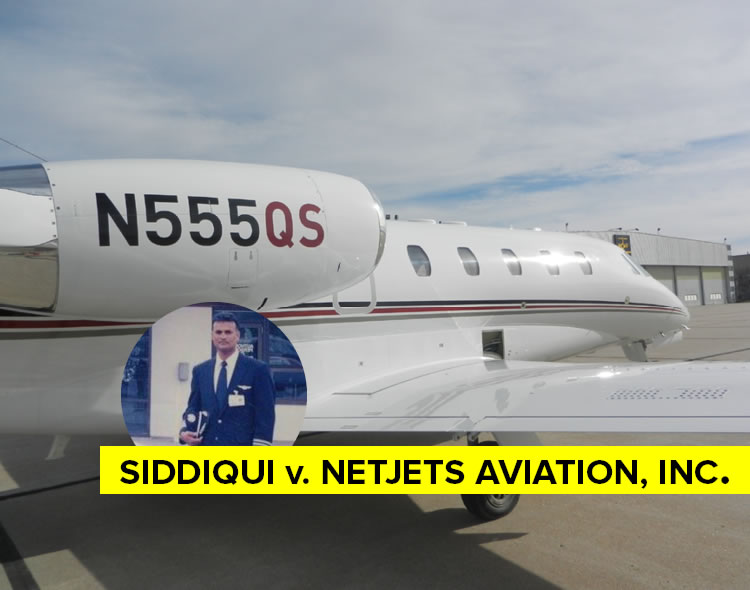DALLAS – Oct 26, 2016 – After seven years of exemplary service, pilot Ameer Siddiqui was suspended and later fired because an unidentified employee allegedly viewed him as a “security concern,” according to an employment discrimination lawsuit filed against Netjets, Inc., and amended this morning in the Southern District Court of Florida (Case No. 1:16-cv-23924).
According to the lawsuit, Siddiqui, 54, started working as a pilot for NetJets, a subsidiary of Berkshire Hathaway, in 2006, flying passengers through West Palm Beach and Miami airports. On September 7, 2013, an official at NetJets called Siddiqui to the company’s headquarters in Ohio without explanation. By the time he arrived the next day, his identification card was deactivated and security refused to allow him on the property.
On September 8, 2013, Siddiqui’s supervisors informed him that the company has “security concerns” about him and that he was no longer allowed on company property. He was asked to return his security card, key and mobile device. Siddiqui called NetJets’ Chief Pilot to get an explanation, but only learned that the company’s actions were based on political comments Siddiqui allegedly made.
Without further explanation, Siddiqui, who had been recently recognized by the Federal Aviation Administration for exemplary performance, was placed on indefinite administrative leave on September 9, 2013.
On December 5, 2013, an FBI agent contacted Siddiqui with regard to a report received about him. Siddiqui agreed to meet with FBI agents in Miami to answer questions related to the report. During the voluntary interview, the FBI agents told Siddiqui that NetJets’ head of security reported Siddiqui to the FBI.
After the interview, the FBI concluded that Siddiqui was not a security concern. Siddiqui received a letter from the FBI on February 24, 2014, confirming there was no relevant open investigation into him.
Despite the FBI closing its inquiry, NetJets did not take Siddiqui off administrative leave or provide him with an opportunity to address any specific allegations against him. After waiting nearly a year to be taken off administration leave, Siddiqui made an internal complaint of discrimination.
On April 1, 2015, Siddiqui traveled to Ohio to meet with NetJets officials for the first time, along with his union representative, to discuss his placement on administrative leave. During this meeting, NetJets officials questioned Siddiqui about allegations that he made comments about Jews, the 9-11 terrorist attacks, the U.S. military and personal beliefs related to his Muslim background. Company officials never told Siddiqui what, exactly, he was alleged to have said.
Later that month, Siddiqui filed a Charge of Discrimination with the Equal Employment Opportunity Commission. NetJets filed a response to the EEOC, claiming that Siddiqui was placed on administrative leave because of “Anti-Semitic, Anti-American” statements that unnamed employees allege Siddiqui made years before.
According to attorneys representing Siddiqui, NetJets never alleged during the EEOC investigation or at any other time that the pilot ever “threatened to engage in any terrorist activity against anyone.”
The EEOC issued Siddiqui a Notice of Right to Sue in May 2016. After his lawsuit was filed in August 2016, Siddiqui received notice that NetJets terminated his employment. The termination notice was dated exactly 90 days after the EEOC closed its investigation, which was his deadline to file the initial lawsuit. NetJets had made a point of arguing to the EEOC that because Siddiqui remained employed and had not been terminated, he had no grounds to complain to the EEOC.
Attorneys at Constitutional Law Center for Muslims in America, a nonprofit law center representing Siddiqui, said that the amended lawsuit filed yesterday adds retaliation and the termination to the charges because NetJets fired Siddiqui so soon after the EEOC investigation was dismissed.
“NetJets’ unlawful and malicious actions toward Mr. Siddiqui have caused him tremendous hardships,” said Christina Jump, Senior Staff Attorney at CLCMA. “He’s lost flight experience, income, his qualifications expired, and he has suffered emotionally as a result of how unfairly NetJets treated him.”
Jump also said that Siddiqui was never given a chance by NetJets to defend himself against any specific allegations the company used as its reason for suspending him.
“The company just accepted the accusing employees’ words at face value without conducting a full investigation,” Jump said. “To this day, Mr. Siddiqui still does not know any specific words or statements attributed to him by any so-called witnesses.”
In the lawsuit, attorneys charge that NetJets subjected Siddiqui to religious, racial, ethnic and age harassment and discrimination, as well as retaliation. Attorneys are seeking compensatory and punitive damages, as well as attorneys’ fees. Siddiqui is also asking for his job back and for NetJets to stop discriminating against him and other employees in the future.
Representatives from Muslim Legal Fund of America, a national charity that funds the defense of constitutional rights for Muslims in America, said that Siddiqui’s case is a shocking, but common view into what many Muslims face across the nation.
“With the rise in anti-Muslim rhetoric, we’re seeing an increase in discrimination against Muslims in the workplace,” said Khalil Meek, executive director of MLFA. “I have no doubt that Ameer’s faith was a significant factor in how unfairly people at NetJets treated him.”
The Constitutional Law Center for Muslims in America, Inc., is a nonprofit law center dedicated to defending the civil liberties and legal rights of Muslims in American courtrooms and litigating issues that are important to the Muslim community. CLCMA is funded by a generous grant from the Muslim Legal Fund of America. Learn more at clcma.org.
Muslim Legal Fund of America is a national civil liberties legal fund that defends the U.S. Bill of Rights by supporting legal cases involving civil liberty encroachments. [Source: MLFA]










Comments powered by CComment